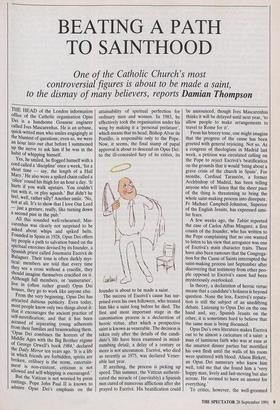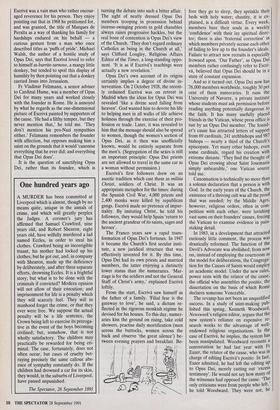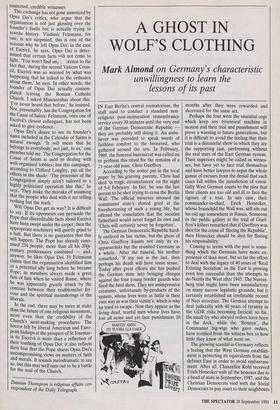BEATING A PATH TO SAINTHOOD
One of the Catholic Church's most controversial figures is about to be made a saint,
to the dismay of many believers, reports Damian Thompson THE HEAD of the London information office of the Catholic organisation Opus Dei is a handsome Goanese engineer called Ives Mascarenhas. He is an urbane, quick-witted man who smiles engagingly at the bluntest of questions; even so, we were an hour into our chat before I summoned up the nerve to ask him if he was in the habit of whipping himself. Yes, he smiled, he flogged himself with a cord called a 'discipline' once a week, 'for a short time — say, the length of a Hail Mary.' He also wore a spiked chain called a `cilice' round his thigh for an hour a day. 'It hurts if you walk upstairs. You couldn't run with it, or play squash.' But didn't he feel, well, rather silly? Another smile. 'No, not at all. It's to show that I love Our Lord — just a gesture, really, like turning down a second pint in the pub.' All this sounded well-rehearsed; Mas- carenhas was clearly not surprised to be asked about whips and spiked belts. Founded in Spain in 1928, Opus Dei offers lay people a path to salvation based on the spiritual exercises devised by its founder, a Spanish priest called Josemaria Escriva de Balaguer. Their tone is often darkly mys- tical: members are told that every time they see a cross without a crucifix, they should imagine themselves crucified on it. Although full members, or `numeraries', live in (often rather grand) Opus Dei houses, they go to work like anyone else. From the very beginning, Opus Dei has attracted dubious publicity. Even today, most people know only two things about it: that it encourages the ancient practice of self-mortification; and that it has been accused of separating young adherents from their families and brainwashing them. Opus Dei combines the horrors of the Middle Ages with the Big Brother regime of George Orwell's book 1984,' declared the Daily Mirror ten years ago. 'It is a life in which friends are forbidden, spirits are broken, celibacy is the norm, entertain- ment is non-existent, criticism is not allowed and self-whipping is encouraged.' But the Vatican is not worried by press cuttings. Pope John Paul II is known to admire Opus Dei's emphasis on the attainability of spiritual perfection for ordinary men and women. In 1983, he effectively took the organisation under his wing by making it a 'personal prelature', which means that its head, Bishop Alvar de Portillo, is responsible only to the Pope. Now, it seems, the final stamp of papal approval is about to descend on Opus Dei: to the ill-concealed fury of its critics, its founder is about to be made a saint.
The success of Escriva's cause has sur- prised even his own followers, who treated him like a saint long before he died. The first and most important stage in the canonisation process is a declaration of heroic virtue, after which a prospective saint is known as venerable. The decision is taken only after the details of the candi- date's life have been examined in mind- numbing detail; a delay of a century or more is not uncommon. Escriva, who died as recently as 1975, was declared Vener- able last year. If anything, the process is picking up speed. This summer, the Vatican authenti- cated the miracle of (inevitably) a Spanish nun cured of numerous afflictions after she prayed to Escriva. His beatification could be announced, though Ives Mascarenhas thinks it will be delayed until next year, 'to allow people to make arrangements to travel to Rome for it'.
From his breezy tone, one might imagine that the progress of the cause has been greeted with general rejoicing. Not so. At a congress of theologians in Madrid last week, a petition was circulated calling on the Pope to reject Escriva's beatification on the grounds that it would 'bring about a grave crisis of the church in Spain'. For months, Cardinal TarancOn, a former Archbishop of Madrid, has been telling anyone who will listen that the sheer pace of the thing is threatening to bring the whole saint-making process into disrepute. Fr Michael Campbell-Johnston, Superior of the English Jesuits, has expressed simi- lar fears.
A few weeks ago, the Tablet reported the case of Carlos Albas Minguez, a first cousin of the founder, who has written to the Pope complaining that no one wanted to listen to his view that arrogance was one of Escriva's main character traits. There have also been rumours that the Congrega- tion for the Cause of Saints interrupted the saint-making process last September after discovering that testimony from other peo- ple opposed to Escriva's cause had been mysteriously overlooked.
In theory, a declaration of heroic virtue means that a candidate's holiness is beyond question. None the less, Escriva's reputa- tion is still the subject of an unedifying debate. Listening to Opus Dei on the one hand and, say, Spanish Jesuits on the other, it is sometimes hard to believe that the same man is being discussed.
Opus Dei's own literature makes Escriva out to be almost a caricature of a saint: a man of luminous faith who was at ease at the smartest dinner parties but mortified his own flesh until the walls of his room were spattered with blood. Alison Birkett, an Opus Dei numerary who knew him well, told me that she found him a 'very happy man, lively and fast-moving but also serene. He seemed to have an answer for everything.'
To critics, however, the well-groomed Escriva was a vain man who rather encour- aged reverence for his person. They enjoy pointing out that in 1968 he petitioned for, and was granted, the title of Marques de Peralta as a way of thanking his family for hardships endured on his behalf — a curious gesture from a man who once described titles as 'puffs of pride'. Michael Walsh, the author of a hostile study of Opus Dei, says that Escriva loved to refer to himself as burrito sarnoso, a mangy little donkey, but tended to spoil this display of humility by then pointing out that a donkey carried Jesus into Jerusalem.
Fr Vladimir Felzmann, a senior adviser to Cardinal Hume, was a member of Opus Dei for many years and worked closely with the founder in Rome. He is annoyed by what he regards as the one-dimensional picture of Escriva painted by supporters of the cause. 'He had a filthy temper, but they never mention that,' he told me. 'They don't mention his pro-Nazi sympathies either.' Felzmann remembers the founder with affection, but opposes making him a saint on the grounds that it would 'canonise everything that he ever did; and everything that Opus Dei does'.
It is the question of sanctifying Opus Dei, rather than its founder, which is turning the debate into such a bitter affair. The sight of neatly dressed Opus Dei members trooping in procession behind incense-swinging priests in gold chasubles always raises progressive hackles, but the real bone of contention is Opus Deli's view of the Church. 'They don't regard ordinary Catholics as being in the Church at all,' says Clifford Longley, Religious Affairs Editor of the Times, a long-standing oppo- nent. 'It is as if Escriva's teachings were actually a new revelation.'
Opus Dei's own account of its origins certainly implies a degree of divine in- tervention. On 2 October 1928, the recent- ly ordained Escriva was on retreat in Madrid when the ideas for Opus Dei was revealed 'like a divine seed falling from heaven'. God wanted him to devote his life to helping men in all walks of life achieve holiness through the exercise of their pro- fession or trade. Later, it was revealed to him that the message should also be spread to women, though the women's section of Opus Dei, as it then was unofficially known, would be entirely separate from the men's. (Segregation of the saes is still an important principle: Opus Dei priests are not allowed to travel in the same car as a woman without permission.) Escriva's first followers drew on an ascetic tradition which cast them as militia Christi, soldiers of Christ. It was an appropriate metaphor for the times: during the Spanish Civil War, 4,000 priests and 2,400 monks were killed by republican gangs. Escriva made no pretence of impar- tiality. By imitating Christ, he told his followers, they would help Spain 'return to the ancient grandeur of its saints, sages and heroes'.
The Franco years saw a rapid trans- formation of Opus Dei's fortunes. In 1947 it became the Church's first secular insti- tute, a new juridical structure that was effectively invented for it. By this time, Opus Dei had its own priests and married members, the latter enjoying a distinctly lower status than the numeraries. 'Mar- riage is for the soldiers and not the General Staff of Christ's army,' explained Escriva loftily.
From the start, Escriva saw himself as the father of a family. 'Filial fear is the gateway to love', he said, a dictum re- flected in the rigorous monkish regime he devised' or his houses. To this day, numer- aries kiss the ground on rising, take cold showers, practise daily mortification (men across the buttocks, women across the back and observe 'the great silence') be- fore they go to sleep, they sprinkle their beds with holy water; chastity, it is ex- plained, is a difficult virtue. Every week, members bare their souls in a weekly 'confidence' with their lay spiritual direc- tor; there is also 'fraternal correction' in which members privately accuse each other of failing to live up to the founder's ideals. Failure to attract new recruits is especially frowned upon. 'Our Father', as Opus Del members rather confusingly refer to Escri- vit., believed that Opus Dei should be in a state of constant expansion.
And so it turned out. Opus Dei now has 76,000 members worldwide, roughly 30 per cent of them numeraries. It runs the University of Navarre, a private institute whose students must ask permission before reading anything potentially dangerous to the faith. It has many usefully placed friends in the Vatican, whose press office is run by an Opus Dei member. The found- er's cause has attracted letters of support from 69 cardinals, 241 archbishops and 987 bishops — nearly a third of the Church's episcopate, Yet many other bishops, even some cardinals, regard his creation with extreme distaste. 'They find the thought of Opus Dei crowing about Saint Josemaria simply unbearable,' one Vatican source told me.
Canonisation is technically no more than a solemn declaration that a person is with God. In the early years of the Church, the existence of a thriving cult was all the proof that was needed; by the Middle Ages, however, religious orders, often in com- petition with each other, were lavishing vast sums on their founders' causes, forcing the Vatican to examine evidence in pain- staking detail. In 1983, in a development that attracted curiously little comment, the process was drastically reformed. The function of the Devil's Advocate was abolished; from now on, instead of employing the courtroom as the model for deliberations, the Congrega- tion for the Causes of Saints would employ an academic model. Under the new rules, power rests with the relator of the cause, the official who assembles the positio, the dissertation on the basis of which Rome declares someone Venerable.
The revamp has not been an unqualified success. In a study of saint-making pub- lished this spring, Kenneth Woodward, Newsweek's religion editor, argues that the new system's reliance on expensive re- search works to the advantage of well- endowed religious organisations. In the case of Escriva, he implies, the system has been manipulated. Woodward recounts a conversation he had last year with Fr Eszer, the relator of the cause, who was in charge of editing Escriva's positio. In fact, Eszer admitted, he had left the editing tip to Opus Dei, merely cutting out 'excess testimony'. He would not say how many of the witnesses had opposed the cause. 'The only criticisms were from people who left,, he told Woodward. They were not, he suspected, credible witnesses.
This exchange has not gone unnoticed by Opus Dei's critics, who argue that the organisation is not just glossing over the founder's faults but is actually trying to rewrite history. Vladimir Felzmann, for one, is not surprised, this is one of the reasons why he left Opus Dei: in the case of Escriva, he says, Opus Dei is deter- mined that certain facts will not come to light. 'You won't find any e.rence to the fact that, during the second Vatican Coun- cil, Escriva was so worried by what was happening that he talked to the orthodox about them,' he says. In other words, the founder of Opus Dei actually contem- plated leaving the Roman Catholic Church. I asked Mascarenhas about this. `I've never heard that before,' he insisted. Nor, presumably, has the Congregation for .the Cause of Saints: Felzmann, once one of Escriva's closest colleagues, has not been asked to give evidence. Opus Dei's desire to see its founder's name included in the Calendar of Saints is natural enough. 'It will mean that he belongs to everybody, not just, to us,' one member told me. The Congregation for the Cause of Saints is used to dealing with well-organised lobbies; but this campaign, according to Clifford Longley, put all the others in the shade. 'The processes of the Congregation simply aren't tailored to a highly politicised operation like this,' he says. 'They make the mistake of assuming that the people who deal with it are telling nothing but the truth.' Will Opus Dei get its way? It is difficult to say. If its opponents can persuade the Pope that discreditable facts about Escriva have been swept under the carpet, then the appropriate machinery will quietly grind to a halt. But there is no guarantee that this will happen. The Pope has already cano- nised 234 people, more than all his 20th- century predecessors combined — and, anyway, he likes Opus Dei. Fr Felzmann claims that the organisation identified him as a potential ally long before he became Pope; its members always made a great fuss of him when he visited Rome, where he was apparently greatly struck by the contrast between their traditionalist fer- vour and the spiritual meanderings of the liberals.
In the end, there may be more at stake than the future of one religious movement, more even than the credibility of the Church's saint-making procedures. The horror felt by liberal American and Euro- pean bishops at the prospect of St Josemar- ia de Escriva is more than a reflection of their loathing of Opus Dei: it also reflects their fear that the Pope shares Opus Dei's uncompromising views on matters of faith and morals. It sounds melodramatic to say so, but this may well turn out to be a battle for the soul of the Church.
Damian Thompson is religious affairs cor- respondent of the Daily Telegraph.




































































 Previous page
Previous page